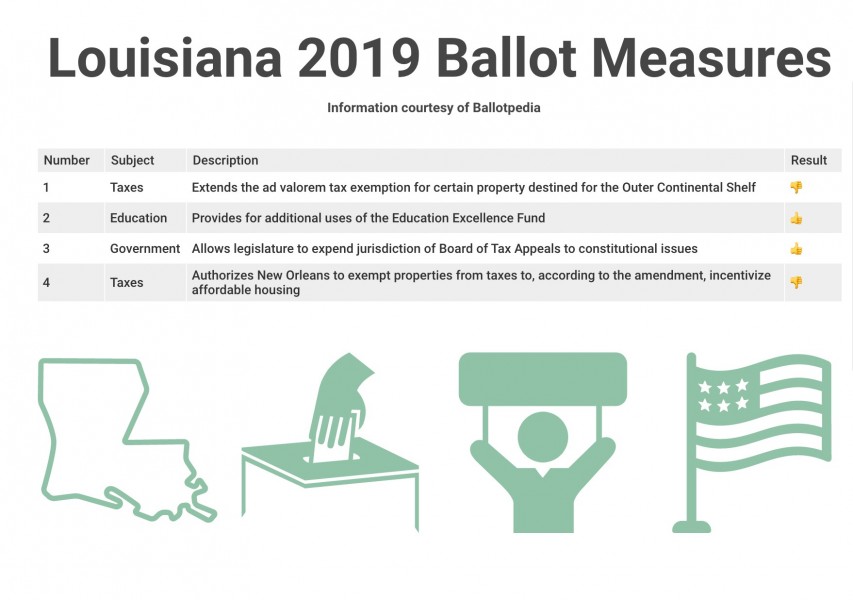Election Day amendments represent shifts in Louisiana policy
October 16, 2019
Julia Prager-Hessel worked for MSNBC this summer in the breaking news political unit.
The gubernatorial primary, which resulted in a November runoff between Gov. John Bel Edwards and businessman Eddie Rispone, probably caught most of Louisiana’s attention this weekend. But when Louisiana voters went to the polls this weekend, they also voted on four amendments to state law. The results represent an important shift in the state’s political psyche.
During state-wide election cycles, it is possible for amendments to state law to be put on the ballot as items to be decided. Four of these “legislatively referred constitutional amendments” were up for grabs on Saturday, and the votes were split. Two passed, two failed, and all four had to do with taxes.
Louisiana voters decided not to cut taxes for housing developments that encourage low-income housing or for industries that import goods into nearby federal waters. This represents a leaning toward higher taxes, regardless of who the tax break might affect.
Residents also decided, in a positive development for the state, to increase funding for schools and public programming. Regarding future constitutional tax questions, voters opted to skip the judicial process and give more power to the executive branch than intended by the constitution in an effort to hasten the process, which might result in a distorted outcome.
Amendment One
Amendment one said that raw materials and goods being imported into federal waters that are not technically a part of individual states could be exempt from the property taxes to which they are currently subject. While this tax break might have impacted the revenue gained from shipping equipment, the number of parishes affected by it — located nearest to the Gulf of Mexico — would be relatively small. This measure failed, and no tax breaks will be given.
While a tax break might have given incentive for industries in these few parishes to do more business, the money earned from these property taxes would have been spread amongst state-funding for other programs later amendments address, like low-income housing, and public funding for schools. When comparing the number of people that could have been impacted by the tax break to the number that are impacted everyday by social programs, it is clear an industrial tax break would benefit fewer Louisianans, which is likely — and rightfully — why this amendment proposal failed.
Coastal parishes showed narrow support for the tax exemptions for offshore goods: https://t.co/Bs1LhLQ14U pic.twitter.com/SyPIVRViXb
— The Lens (@TheLensNOLA) October 13, 2019
Amendment Two
Amendment two would allow the Education Excellence Fund to give money to three more schools — Thrive Academy in Baton Rouge, the LSU Laboratory School and the Southern University Laboratory School — as well as fund the Louisiana Educational Television Authority, an educational and cultural public television station. This measure was a more partisan liberal measure and passed.
Considering Louisiana’s education system is ranked 48th in the country, it is definitely a step in the right direction to increase funding for schools and public programming. Gov. Edwards has put education at the forefront of both his tenure and his platform, and this approval could be an indicator of how voters feel about those measures come election day next month.
https://twitter.com/thecentersquare/status/1122842727417352192
Amendment Three
The third ballot measure would allow the Board of Tax Appeals to make rulings on taxing issues related to the Constitution without having to go through the judicial branch. Though it is traditionally the role of the judiciary to make constitutional rulings, the idea of this amendment is to give greater speed and efficiency to the tax appeal process by allowing an arm of the state-wide executive branch to make these decisions as well. This amendment passed.
This amendment seems to be a short-term solution to the long-term problem of a clogged bureaucracy. While this amendment might be great for speeding up the progress of decisions on tax laws, it is, ultimately, skipping a step in governing and giving more power to the executive branch than it is intended to have. If voters trust their officials, this could be a positive development. If not, this could be handing the power over taxpayer dollars usually wielded by a larger lawmaking body to a select few.
Amendment Four
The fourth and final amendment on the ballot is also a rather liberal effort one but, unlike the second, failed. Though the whole state was eligible to vote on the measure because the money would have been subject to a state tax, it only would have affected New Orleans in practice.
The amendment would have allowed tax exemptions for certain housing developments in the city, specifically affordable housing centers with fewer than 15 units. According to the language of the amendment, the tax break would be “for the purpose of promoting affordable housing.”
Louisiana rejects amendment for affordable New Orleans housing https://t.co/pkz3GA7J4A
— WWL-TV (@WWLTV) October 13, 2019
Its failure signifies an unwillingness to support housing programs for low-income citizens outside of state-directed reforms and may be the result of resentment from people in other parts of Louisiana toward the programs that specifically affect New Orleans.
Even though the excitement of the gubernatorial runoff is hard to match, voters in Louisiana and political junkies across the Deep South should pay close attention to the amendments that pass and fail, as they can indicate the region’s voter tendencies before this election day and future ones.
With a Democratic governor at the helm and a willingness to increase spending on social programs like schools and public television, a red state in the heart of the Deep South may see some blue in its future.










Leave a Comment